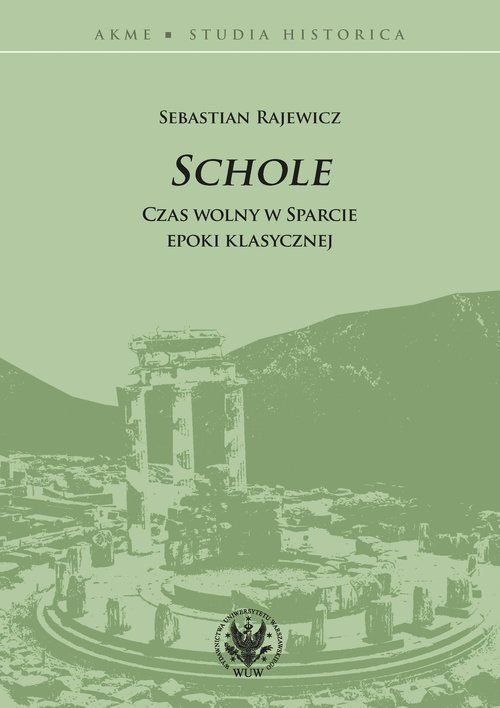X
-
Załączniki bezpieczeństwa
Załczniki do produktuZałączniki dotyczące bezpieczeństwa produktu zawierają informacje o opakowaniu produktu i mogą dostarczać kluczowych informacji dotyczących bezpieczeństwa konkretnego produktu
-
Informacje o producencie
Informacje o producencieInformacje dotyczące produktu obejmują adres i powiązane dane producenta produktu.wydawnictwa uniwersytetu warszawskiego
-
Osoba odpowiedzialna w UE
Osoba odpowiedzialna w UEPodmiot gospodarczy z siedzibą w UE zapewniający zgodność produktu z wymaganymi przepisami.
W pamięci zbiorowej Sparta zapisała się jako obóz wojskowy. W świecie, w którym obywatele poświęcali życie wojnie i innym potrzebom państwa, nie było miejsca na czas wolny. Autor kwestionuje ten zmitologizowany obraz, przyjmując odmienną od dotychczasowych perspektywę: zamiast, jak autorzy antyczni, skupiać się na państwie i jego potrzebach, zwraca uwagę na sferę prywatną, bliższą refleksji nad tytułową schole. Dowodzi, że życie Spartan mogło przypominać życie w obozie wojennym wyłącznie w okresie, kiedy przechodzili sławetne państwowe wychowanie. Po jego zakończeniu mieli dużo czasu na angażowanie się w różnorodne aktywności. Analiza form spędzania czasu wolnego przez mężczyzn pokazuje, że Sparta w wielu aspektach była podobna do innych greckich państw. Nieco inaczej było w przypadku kobiet: Greków dziwiły nie tylko aktywności, do których zostały zobowiązane przez wspólnotę, ale także sposób, w jaki niektóre z nich spędzały czas wolny, przekraczając granice między tym, co uznawano za „męskie” i „żeńskie”.
Schole. Leisure in Classical Sparta
In collective memory, the image of Sparta is that of a military encampment. In a world where the citizens devoted their lives to war and other needs of the state, there was no place for leisure. The author calls into question this mythologised perception, adopting a new perspective: instead of focusing, following the ancient authors, on the state and its needs, he pays special attention to the private sphere, which is more befitting for a reflection on the titular schole. He demonstrates that the life of Spartans might have resembled life in a military camp only during the period of the famed state education. Once the education was complete, the citizens had abundant leisure time to engage in various activities, including: family life, extramarital unions, pederasty, entertainment during feasts, sport, hunting, and horse and hound breeding.
Keywords: Sparta, classical period, leisure, schole, private time
Schole. Leisure in Classical Sparta
In collective memory, the image of Sparta is that of a military encampment. In a world where the citizens devoted their lives to war and other needs of the state, there was no place for leisure. The author calls into question this mythologised perception, adopting a new perspective: instead of focusing, following the ancient authors, on the state and its needs, he pays special attention to the private sphere, which is more befitting for a reflection on the titular schole. He demonstrates that the life of Spartans might have resembled life in a military camp only during the period of the famed state education. Once the education was complete, the citizens had abundant leisure time to engage in various activities, including: family life, extramarital unions, pederasty, entertainment during feasts, sport, hunting, and horse and hound breeding.
Keywords: Sparta, classical period, leisure, schole, private time

 50 szt.
50 szt.
